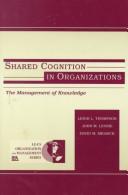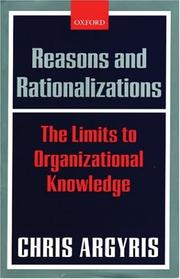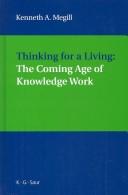| Listing 1 - 10 of 13 | << page >> |
Sort by
|
Book
ISBN: 9781907722264 1907722262 Year: 2011 Publisher: Hertfordshire Ecademy Press
Abstract | Keywords | Export | Availability | Bookmark
 Loading...
Loading...Choose an application
- Reference Manager
- EndNote
- RefWorks (Direct export to RefWorks)
Connaissances [Gestion des ] --- Gestion de la connaissance --- Gestion des connaissances --- Gestion du savoir --- KM --- Kennisbeheer --- Kennismanagement --- Knowledge management --- Management of knowledge assets --- Knowledge management. --- Organizational learning --- Management --- Monograph

ISBN: 1856043398 Year: 2001
Abstract | Keywords | Export | Availability | Bookmark
 Loading...
Loading...Choose an application
- Reference Manager
- EndNote
- RefWorks (Direct export to RefWorks)
Organization theory --- Documentation and information --- Connaissances [Gestion des ] --- Gestion de la connaissance --- Gestion des connaissances --- Gestion du savoir --- KM --- Kennisbeheer --- Kennismanagement --- Knowledge management --- Management of knowledge assets --- Knowledge management.

ISBN: 0805828915 0805828907 Year: 1999 Volume: *1 Publisher: Mahwah (N.J.) : Erlbaum,
Abstract | Keywords | Export | Availability | Bookmark
 Loading...
Loading...Choose an application
- Reference Manager
- EndNote
- RefWorks (Direct export to RefWorks)
Connaissances [Gestion des ] --- Gestion de la connaissance --- Gestion des connaissances --- Gestion du savoir --- KM --- Kennisbeheer --- Kennismanagement --- Knowledge management --- Management of knowledge assets --- Organisatie --- Organisation --- Organization --- Knowledge management. --- Organization. --- #PBIB:2001.3 --- Management --- Information technology --- Intellectual capital --- Organizational learning
Book
ISBN: 9789052016023 905201602X Year: 2010 Publisher: Bruxelles: Peter Lang,
Abstract | Keywords | Export | Availability | Bookmark
 Loading...
Loading...Choose an application
- Reference Manager
- EndNote
- RefWorks (Direct export to RefWorks)
Connaissances [Gestion des ] --- Gestion de la connaissance --- Gestion des connaissances --- Gestion du savoir --- KM --- Kennisbeheer --- Kennismanagement --- Knowledge management --- Management of knowledge assets --- Technological innovations --- Business enterprises --- Economic aspects --- Computer networks --- Technological innovations - Economic aspects --- Business enterprises - Computer networks

ISBN: 019926807X 0199286825 019169925X 0191533246 1280903864 9780191533242 Year: 2004 Publisher: Oxford ; New York Oxford University Press
Abstract | Keywords | Export | Availability | Bookmark
 Loading...
Loading...Choose an application
- Reference Manager
- EndNote
- RefWorks (Direct export to RefWorks)
What is the purpose of social science and management research? Do scholars/researchers have a responsibility to generate insights and knowledge that are of practical (implementable) value and validity? The author questions many of the assumptions of organizational theory and research.
Organization theory --- Theory of knowledge --- Connaissances [Gestion des ] --- Gestion de la connaissance --- Gestion des connaissances --- Gestion du savoir --- KM --- Kennisbeheer --- Kennismanagement --- Knowledge management --- Management of knowledge assets --- Organisaties--Aanleren --- Organisations--Apprentissage --- Organizational learning --- Organizational learning. --- Knowledge management. --- Apprentissage organisationnel --- E-books --- Management --- Information technology --- Intellectual capital --- Learning organizations --- Learning --- Communities of practice --- organisation de l'entreprise --- apprentissage organisationnel

ISBN: 1403947600 1349524433 0230371892 1283647931 Year: 2006 Publisher: Houndmills ; New York Palgrave Macmillan
Abstract | Keywords | Export | Availability | Bookmark
 Loading...
Loading...Choose an application
- Reference Manager
- EndNote
- RefWorks (Direct export to RefWorks)
Connaissances [Gestion des ] --- Gestion de la connaissance --- Gestion des connaissances --- Gestion du savoir --- KM --- Kennisbeheer --- Kennismanagement --- Knowledge management --- Management of knowledge assets --- 658 --- Organizational learning --- 658.4038 --- Learning organizations --- Learning --- Communities of practice --- Management --- Information technology --- Intellectual capital --- Business management, administration. Commercial organization --- 658 Business management, administration. Commercial organization --- 658 Zaakvoering, administrat --- Zaakvoering, administrat

ISBN: 3598116381 9786613403339 359844009X 1283403331 9781283403337 9783598440090 Year: 2004 Publisher: München : K.G. Saur,
Abstract | Keywords | Export | Availability | Bookmark
 Loading...
Loading...Choose an application
- Reference Manager
- EndNote
- RefWorks (Direct export to RefWorks)
Knowledge Management as a term has been around for more than a decade, but do we really know what it means? This far-reaching book tackles the thorny question of how to define knowledge management and make it work in the 21st century. It questions our beliefs in the role of the information profession, but also sets out the issues in a much wider context of different subjects and disciplines. It develops the idea of the knowledge culture and knowledge work and goes on to expand on how information needs to be shared and not hoarded as in the traditional role of libraries as keepers of knowledge.
Library management --- Breinwerkers --- Connaissance [Travailleurs de la ] --- Connaissances [Gestion des ] --- Gestion de la connaissance --- Gestion des connaissances --- Gestion du savoir --- Information workers --- KM --- Kennisbeheer --- Kennismanagement --- Knowledge management --- Knowledge workers --- Management of knowledge assets --- Savoir [Travailleurs du ] --- Travailleurs de la connaissance --- Travailleurs du savoir --- 002 --- Informatieverzorging i. v. m. documentatie --- Knowledge management. --- Knowledge workers. --- Management Theory --- Management --- Business & Economics --- 002 Informatieverzorging i. v. m. documentatie --- Employees --- Intellectual capital --- Information technology --- Organizational learning
Book
ISBN: 9058330613 Year: 2001 Publisher: Nijmegen Katholieke Universiteit
Abstract | Keywords | Export | Availability | Bookmark
 Loading...
Loading...Choose an application
- Reference Manager
- EndNote
- RefWorks (Direct export to RefWorks)
Connaissances [Gestion des ] --- Gestion de la connaissance --- Gestion des connaissances --- Gestion du savoir --- Informatiemaatschappij --- Information society --- Informationsgesellschaft --- KM --- Kennisbeheer --- Kennismanagement --- Knowledge management --- Management of knowledge assets --- Sociedade da informação --- Société de l'information --- Société de la connaissance --- Société du savoir --- #SBIB:021.IO --- #SBIB:35H435 --- #SBIB:316.334.2A26 --- #gsdb5 --- Beleidssectoren: economisch en werkgelegenheidsbeleid --- Ontwikkeling van de industriële structuur: deïndustrialisering, diensteneconomie --- Research [Industrial ] --- Economic aspects

ISBN: 0262011956 9786612099793 0262266776 1282099795 0585456755 9780262266772 9780585456751 9780262011952 Year: 2003 Publisher: Cambridge, Mass. : MIT Press,
Abstract | Keywords | Export | Availability | Bookmark
 Loading...
Loading...Choose an application
- Reference Manager
- EndNote
- RefWorks (Direct export to RefWorks)
An overview of expertise sharing, an approach to knowledge management that emphasizes the human components of knowledge work in addition to information storage and retrieval. The field of knowledge management focuses on how organizations can most effectively store, manage, retrieve, and enlarge their intellectual properties. The repository view of knowledge management emphasizes the gathering, providing, and filtering of explicit knowledge. The information in a repository has the advantage of being easily transferable and reusable. But it is not easy to use decontextualized information, and users often need access to human experts. This book describes a more recent approach to knowledge management, which the authors call "expertise sharing." Expertise sharing emphasizes the human aspects--cognitive, social, cultural, and organizational--of knowledge management, in addition to information storage and retrieval. Rather than focusing on the management level of an organization, expertise sharing focuses on the self-organized activities of the organization's members. The book addresses the concerns of both researchers and practitioners, describing current literature and research as well as offering information on implementing systems. It consists of three parts: an introduction to knowledge sharing in large organizations; empirical studies of expertise sharing in different types of settings; and detailed descriptions of computer systems that can route queries, assemble people and work, and augment naturally occurring social networks within organizations.
Connaissances [Gestion des ] --- Gestion de la connaissance --- Gestion des connaissances --- Gestion du savoir --- Homme et ordinateur [Interaction entre ] --- Human-computer interaction --- Interactie tussen mens en computer --- Interaction entre l'homme et l'ordinateur --- KM --- Kennisbeheer --- Kennismanagement --- Knowledge management --- Management of knowledge assets --- Mens-computer interactie --- 002 --- Informatieverzorging i. v. m. documentatie --- Human-computer interaction. --- Information technology -- Management. --- Knowledge management. --- Organizational learning -- Management. --- Management --- Business & Economics --- Management Theory --- 002 Informatieverzorging i. v. m. documentatie --- Organizational learning --- Information technology --- Management. --- Computer-human interaction --- Human factors in computing systems --- Interaction, Human-computer --- Learning organizations --- Learning --- Communities of practice --- Intellectual capital --- Human engineering --- User-centered system design --- User interfaces (Computer systems) --- BUSINESS/Management --- Monograph
Book
ISSN: 17814944 ISBN: 9782804166748 2804166740 2807346588 Year: 2012 Volume: *23 Publisher: Bruxelles: De Boeck,
Abstract | Keywords | Export | Availability | Bookmark
 Loading...
Loading...Choose an application
- Reference Manager
- EndNote
- RefWorks (Direct export to RefWorks)
Nous pénétrons progressivement et durablement dans un nouveau monde immatériel où le savoir et l'innovation sont au c ur de la croissance et du développement économique. De nouveaux acteurs émergent et prospèrent sur cette nouvelle scène de la connaissance : des travailleurs et des professionnels du savoir, des organisations intensives en connaissances, qui se localisent et fertilisent le plus souvent au sein d'agglomérations du savoir. Ils contribuent tous à alimenter cette "nouvelle économie". De manière à appréhender cette nouvelle scène et ses différents acteurs et espaces, l ouvrage, se propose d'éclairer, de revisiter et d'approfondir le concept de savoir dans ses différentes dimensions : historique, sociologique et économique, en proposant notamment des catégorisations et des grilles de lectures conceptuelles et pragmatiques pour en saisir ses modes de construction, ses enjeux et ses perspectives. Ecrit par un auteur "hybride", à la fois chercheur et consultant, l'ouvrage s'adresse à un large public comportant des managers, des professionnels, des consultants, des enseignants-chercheurs et des étudiants. Jean-Pierre Bouchez est professeur-associé à l'Université de Versailles Saint-Quentin (ISM/Laboratoire Larequoi) et Directeur Recherche et Innovation à IDRH (conseil en management), après avoir été Directeur d'activité au sein des cabinets Altedia et Bernard Brunhes Consultants. A ce titre, il intervient depuis une dizaine d'années comme consultant en management et conférencier auprès de nombreuses organisations et entreprises publiques et privées, françaises et internationales. Il a été auparavant Directeur des Ressources Humaines pour de grandes firmes internationales (Thales, Nielsen). Il est par ailleurs auteur de plusieurs ouvrages, ainsi que de nombreuses publications à caractère académique et professionnel.
Breinwerkers --- Capitalisme cognitif --- Connaissance [Travailleurs de la ] --- Connaissance [Économie de la ] --- Connaissances [Gestion des ] --- Economy of knowledge --- Gestion de la connaissance --- Gestion des connaissances --- Gestion du savoir --- Industries de la connaissance --- Industries du savoir --- Information economy --- Information workers --- KBE (Knowledge-based economy) --- KM --- Kennisbeheer --- Kenniseconomie --- Kennismanagement --- Knowledge economy --- Knowledge management --- Knowledge workers --- Knowledge-based economy --- Management of knowledge assets --- Savoir [Travailleurs du ] --- Savoir [Économie du ] --- Travailleurs de la connaissance --- Travailleurs du savoir --- Économie de la connaissance --- Économie du savoir --- Économie fondée sur la connaissance --- Économie fondée sur le savoir --- Economic development --- International finance --- Développement économique --- Finances internationales --- Education --- Information technology --- Economic aspects --- Développement économique --- Education - Economic aspects
| Listing 1 - 10 of 13 | << page >> |
Sort by
|

 Search
Search Feedback
Feedback About UniCat
About UniCat  Help
Help News
News